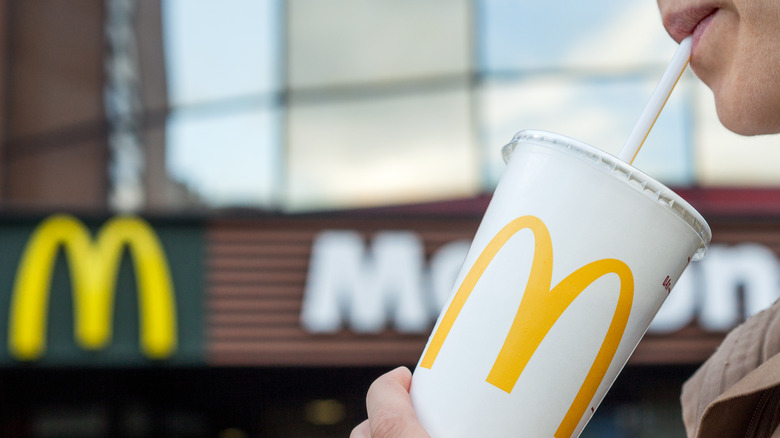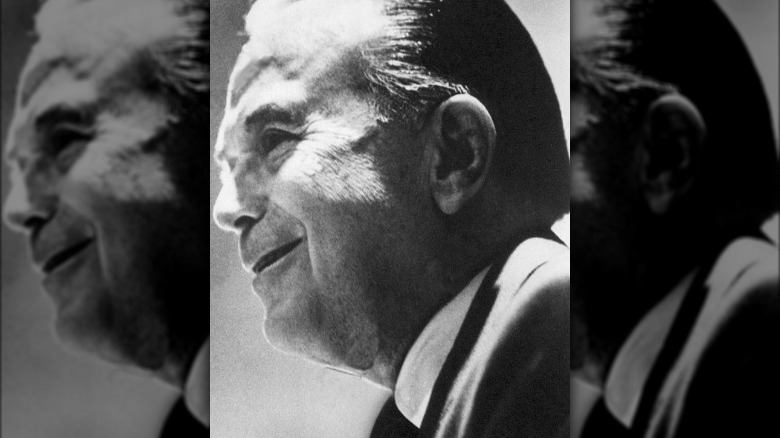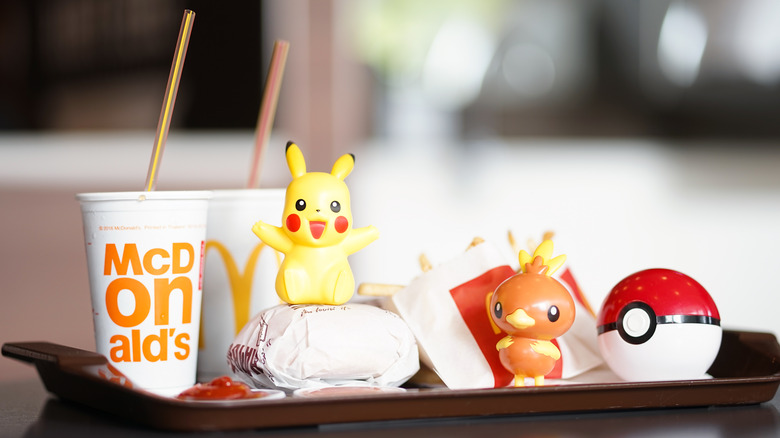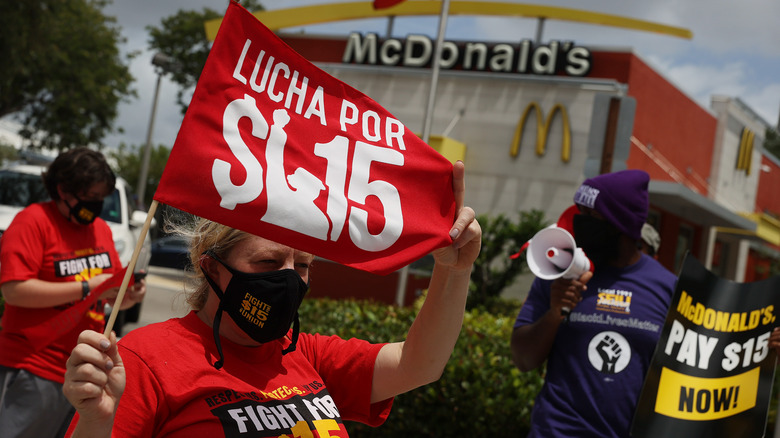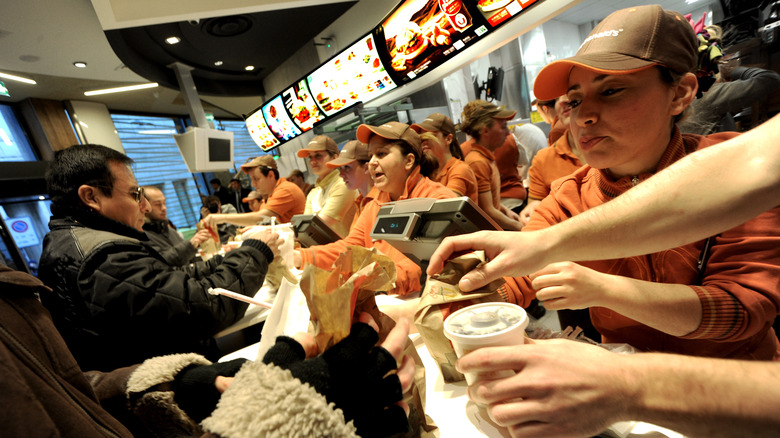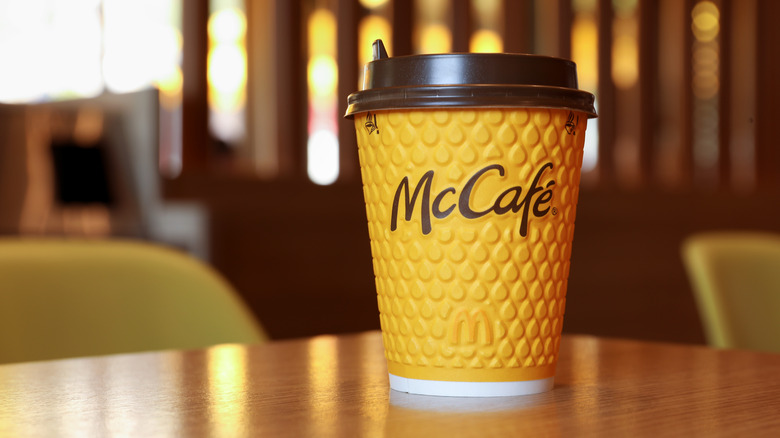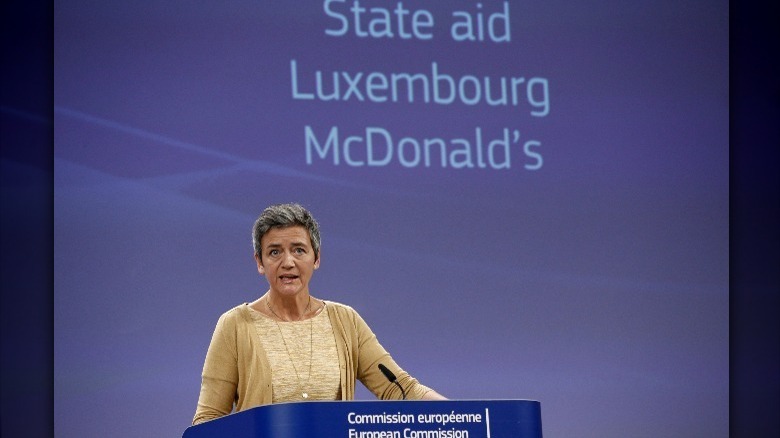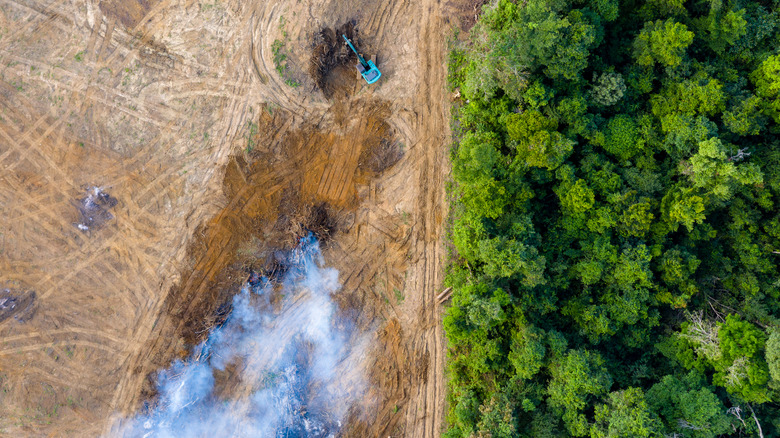9 Times McDonalds Got Too Greedy
McDonald's undoubtedly one of the biggest names in food. With over 39,000 locations in almost 100 countries, it should come as no surprise that their annual revenue is sky high, valued at a whopping $19 billion dollars (via Statista). Luckily for the rest of us, who can only dream of touching that much money, McDonald's is no stranger to giving back. The chain provides tuition assistance to employees pursuing college degrees, gives scholarships to AAPI, Latinx, and Black students, and helps families with sick children at their Ronald McDonald Houses, just to name a few good deeds.
But despite their charitable contributions, McDonald's has been accused many times of excessive greed. From claiming half a slice of cheese is tastier than a whole to selling expired products, cost-cutting practices within McDonald's restaurants have come under the scrutiny of customers and law enforcement alike. If that wasn't enough, the corporation behind the restaurants has come under scrutiny too, being blamed for deforestation in the Amazon rainforest and arraigned for potential tax fraud and bribery of government officials. Hey, whatever it takes to keep a Big Mac less than $4, right? Read on to see just how many times McDonald's has gotten a little too greedy.
1. It all started with Ray Kroc
While McDonald's was started in 1940 by two brothers, Maurice and Richard McDonald, the story of the chain's founding is largely attributed to a man named Ray Kroc. According to the McDonald's website, Kroc saw great promise in the small business, became a franchise agent in 1955, and built the chain into what it is today. Soon enough, he bought out the McDonald brothers for $2.7 million (via Money). With this sale, Kroc became the exclusive owner of the rights to the McDonald name and its accompanying restaurants — except, notably, for the original location in San Bernardino, which would remain in the hands of the McDonald brothers.
But Kroc didn't stop at ownership. He began calling himself the founder of the chain – despite the fact that 10 locations were opened before he became a part of the business — a story which McDonald's Corporation stuck to until 1991. Additionally, he purposefully opened a McDonald's across from the original San Bernardino location, and they soon went under.
In an interview with TIME (via Money), he proudly announced, "I ran 'em out of business." He went on to say that the McDonald brothers made him angry by writing the original restaurant out of the deal, and that he simply "needed the McDonald name and those golden arches." Today, Kroc is largely seen as the man who transformed a mom-and-pop burger joint into a multi-billion dollar business (although the truth behind his reputation remains murky).
2. Small serving sizes
McDonald's has repeatedly come under fire for serving sizes that leave something to be desired. For instance, customers have criticized the chain for using only half a slice of cheese on their Filet-O-Fish sandwiches. Many see the decision as a money-saving move, such as one angry customer, who took to Reddit in protest. "McDonald's WTF IS THIS. DON'T BE SO GREEDY, ACTUALLY GIVE ME A FULL SLICE OF CHEESE" exclaimed user Yusuf-Misbah in a short thread. The company claims the missing cheese is an intentional gastronomic move, as "With the filet, a half slice complements the taste, rather than overwhelming it." Whether born of greed or a genuine reverence for frozen squares of Alaskan pollock, well, that's up for you to decide.
The chain has also been criticized for skimping during promotions, such as with the great Szechuan Sauce debacle of 2017. McDonald's brought back the sauce, which had not been seen in stores since 1998, after it featured prominently in the season premiere of "Rick and Morty." The sauce's return and the burst of attention it caused resulted in McDonald's instating a one-day promotion, where fans could try the once-extinct sauce for themselves. However, what they failed to announce was that only "20 to 40 sauce packets" would be available per store (via Business Insider). Fans, many of whom waited in lines for hours on end, felt cheated, with some even claiming "false advertising" and threatening class-action lawsuits.
3. Purposefully selling expired products
If skimping on product wasn't bad enough, McDonald's has been accused of intentionally selling expired products rather than taking a profit loss. According to the Korea Times, one location in Seoul faced such allegations in August of 2021 after an employee whistleblower circulated alarming videos. The videos, taken secretly on a phone camera, show workers replacing old expiration date stickers with new ones on tortillas and hamburger buns. The anonymous source attributes the practice to management feeling "like they had to reduce the losses." McDonald's Korea promptly responded, blaming a manager as well as a part-time staffer and claiming they had no idea the store was selling expired products. However, the whistleblower remained skeptical of the chain's practices as a whole, saying, "We are not the only restaurant doing this as far as I am concerned."
While McDonald's asserted their HQ was not involved in the decision to pedal expired food, similar reports have come from workers and customers at McDonald's locations around the world. Whether because of greed or simply carelessness, they have also been accused by overseas news outlets of selling meat too long after it has been cooked.
4. Using "toys as bait" for more sales
McDonald's first began marketing to kids in the 1950s, when Ray Kroc decided to cater to his 228 family-filled, suburban franchises. However, some customers claim the fast food giant has gone too far. It all started in 2002, when a pair of teenagers sued after frequenting the chain and developing issues like diabetes, high blood pressure, and coronary heart disease. According to their lawyer, as described in TIME, "the chain's kid-focused ads and toy promotions portrayed McDonald's as child friendly," so his young clients assumed they could eat there often without worry. In response, McDonald's insisted they were not responsible for the actions or "lifestyle choices" of the teens which caused their health issues, and a judge agreed – the case was dismissed in 2003.
The issue was brought up again in 2010, when a mother accused McDonald's of using "toys as bait" to lure children to the restaurant and create a subconscious preference for unhealthy food. Her subsequent class-action suit, which alleged the practices were "unlawful," "unfair," and "inherently deceptive," was also eventually dismissed.
Most recently, in 2018, a Canadian father sued the chain. His class-action suit claimed marketing to children using toys was against the law in Quebec, and lo and behold, the court actually sided with him. The resulting settlement mandated McDonald's pay a total of $1 million to four local charities, in addition to implementing a number of safeguards for younger consumers like removing toys from their eye level.
5. Underpaying workers
Depressing workers' wages is about as classic of a greedy business move as it gets — a move McDonald's has been accused of many times. Since 2018 alone, several major strikes have made national headlines as McDonald's workers fight for better wages. One strike, which took place in May of 2018, involved 150 workers blocking entry to McDonald's Chicago headquarters. Strikers called for a $15 minimum wage, with employees sharing stories about needing food stamps despite working full-time and seeing raises of less than two dollars over a four-year period. Another strike in May of 2019 involved a collective effort across 16 cities, with workers again demanding $15 per hour (via SEIU).
While the strikers did not get what they asked for, McDonald's agreed to pay $26 million in stolen wages to a group of employees in 2019. The sum was calculated as part of a class-action lawsuit, which had been ongoing since 2013, and represented a major win for workers who have long felt undervalued by the company. However, strikes in 2020 and 2021 showed little has changed, with workers calling yet again for a standard $15 minimum wage.
Thankfully, in May of 2021, McDonald's pledged to raise wages for employees at non-franchise locations. According to their calculations, by 2024, the average pay for employees at company-owned restaurants should be around $15 an hour. However, with more than 95% of locations existing as franchises, it is unclear how much will change for the majority of McDonald's workers.
6. Pressuring employees to work faster, causing safety issues
McDonald's employees have accused the company of valuing efficiency over employee safety. Repeated incidents resulted in a flurry of OSHA complaints in 2015, when 28 individual claims across 19 cities were brought to the attention of authorities. The complaints contained a laundry list of offenses, including telling employees to "treat burns with condiments like mustard" rather than sending them to the hospital, rushing employees to clean fryers while they are still hot, and the pressure to move quickly causing falls on wet or greasy floors.
According to CNN, some workers who were seriously injured due to workplace pressures faced weeks of recovery without pay. While McDonald's said they would seriously investigate all the complaints, they asserted the filings were simply part of a "larger strategy orchestrated by activists targeting our brand and designed to generate media coverage." Yikes.
Issues of efficiency versus worker safety came back into the spotlight during COVID-19, resulting in more legal action. In August of 2021, workers at an Oakland McDonald's successfully sued the fast food giant for greater workplace safety measures relating to the pandemic. The plaintiffs claimed they were not allowed to go home even if they displayed COVID-19 symptoms, and that managers "delayed" telling other workers they may have been exposed, thereby limiting the amount of PTO the chain would have to fund. The court siding with the worker plaintiffs not only called out McDonald's on their greedy behavior, but ensured greater protections for essential workers across America.
7. Offering only $800 to a burned customer
In 1992, 79-year-old Stella Liebeck bought a hot coffee from a McDonald's drive-thru. Liebeck squeezed the cup between her legs, removed the lid, and accidentally spilled the coffee in her lap. The coffee was apparently extremely hot, and Liebeck sustained third-degree burns over 6% of her body. She spent eight days in the hospital and months in recovery for her injuries, even undergoing multiple surgeries.
Liebeck sued McDonald's, initially looking to settle for $20,000 for medical bills and lost income — but the fast food giant refused to put up more than $800. The long, publicized legal battle that followed revealed McDonald's coffee is kept 40-55 degrees hotter than coffee brewed at home, and that over 700 McDonald's coffee burn claims had been filed between 1982 and 1992. When questioned about the extreme temperature of their coffee, McDonald's claimed that hotter coffee stays fresher longer, which is important for their large customer base. While that is certainly one way to put it, Delish reports that the coffee's extreme temperatures could also be "a business decision" which allows McDonald's to brew less coffee and "make more profit even if they're paying settlements."
Based on the evidence, jurors overwhelmingly took Liebeck's side, with one even claiming McDonald's coffee temperatures showed "callous disregard for the safety of the people." The jury voted on an award of $2.7 million (or, two days of coffee sales at McDonald's), although the case was ultimately settled privately for an unknown sum.
8. Alleged tax fraud and bribery
If the restaurants themselves weren't attracting enough attention, the corporation behind McDonald's has been accused of greedy and illegal business dealings in several corners of the world. In 2015, reports Reuters, the chain was accused of dodging $1.1 billion in taxes in Europe over a four-year period. Supposedly, the restaurant was allowed to "make tax-deductible royalty payments equivalent to five percent of [revenue] to a lightly taxed subsidiary in Luxembourg," thereby avoiding taxes they should have paid in other European nations. However, the European Commission ultimately decided in 2018 that Luxembourg did not provide McDonald's with illegal state aid, and the allegations died down.
Not one year later, Arcos Dorados Holdings (the company responsible for franchises in Latin America) was accused of breaking franchise laws and bribing government officials to avoid tax laws in Brazil. According to the New York Times, the alleged bribes may have "resulted in the enactment of a new regulation that helped reduce the company's tax burden."
The Brazilian senate opened an investigation, hearing claims about the corporation's supposed "fiscal and economic crimes" in addition to potential labor abuses. While Arcos Dorados was invited to give a statement, they refused to attend, asserting they were "absolutely convinced that the company has complied" with the law. Unlike the Luxembourg case, the jury is still out on this one, and no decisions have been made by the Brazilian investigators at the time of writing.
9. Causing deforestation in the Amazon
In 2006, McDonald's was one of several corporations accused of contributing to increased deforestation in the Amazon rainforest. The claim came from a Greenpeace report, which linked a soy-based animal feed used by one of the chain's main chicken producers to potentially destructive practices in the South American jungle. The report details how increased soy production in Brazil has led to widespread forest clearing, pushed slash-and-burn farmers further into previously untouched forests, and trapped smaller ranchers into "debt bondage" and "conditions analogous to slavery" (via Mongabay).
Greenpeace directly targeted McDonald's, saying the harmfully procured Brazilian soy "ensure[s] that Chicken McNuggets and other meats remain cheap and abundant for European consumers." In the wake of the controversy, McDonald's claimed they would be "investigating this claim fully." They eventually joined a "soy moratorium," in which companies pledged not to buy soy products from "farmers who clear the rainforest, use slave labour or threaten Indigenous Lands" in a designated area. Additionally, the burger giant made a pledge in 2015 to end deforestation in its supply chain, with poultry as one of its top concerns.
However, protestors converged again in 2017 when a Mongabay report claimed little had changed. The investigation contended producers "simply shifted their sights to nearby areas," causing many of the same issues that plagued other Brazilian lands before the moratorium. This time, McDonald's refused to comment on the issue, and it is unclear if they intend to take any action.
